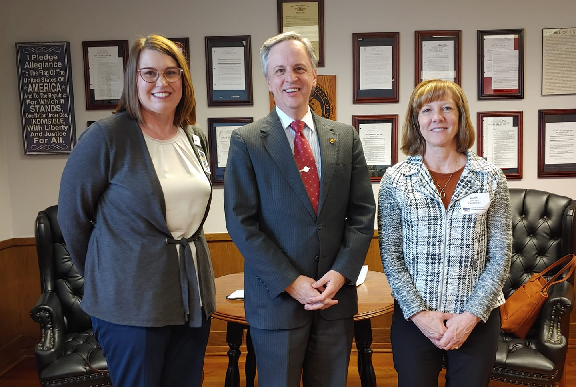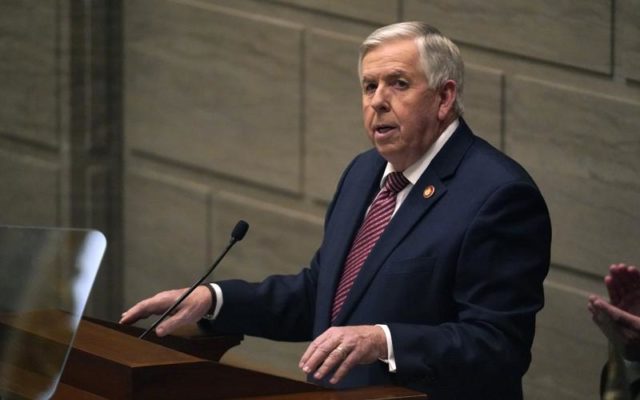THE EGGLESTON REPORT – HALFTIME

If the legislative session were a football game, we would now be at halftime. Your Missouri legislature debates bills and passes new laws from early January until mid-May. There is a one-week break in the middle where members can go back to their districts, meet with their constituents, and recharge their batteries for the second half of session. That week is this week (March 11-20).
We in the House have had a good, productive first half. Before adjourning, the House passed bills sponsored by 42 members. These bills include limiting Covid mandates (HB 1686, HB 2358, HB 1861), protecting our 2nd Amendment rights (HB 1462), helping our farmers (HB 1720), reforming our initiative petition process (HJR 79, HJR 91), election integrity (HB 1878, HJR 94), and supporting law enforcement (HB 1986). The Senate, which was bogged down early on, also ended up passing seven bills before the break. All bills that passed one chamber still need to be passed in the other chamber before going to the governor’s desk.
I ended up filing eight bills before the filing deadline closed. Two of them – HB 1861 which protects organ transplant patients from Covid mandates, and HJR 91 which is initiative petition reform – were among the bills that passed out of the House. I also have three other bills which have made it through committee and could be brought up when we return. They are HB1860, which ties the length of time someone can collect unemployment to the current unemployment rate so we can help employers get more job positions filled; HB 2499, which phases out our ineffective vehicle inspection program; and HB 1859, which defines how local ballot measures are labeled. It will be up to the House floor leader if and when those bills will be brought up for debate.
This letter is just a partial explanation of our first half of work. For the complete list, or any questions, please email me at [email protected]. And if you would like to host a town hall or have me speak with your group to learn more about what is really going on in Jefferson City, you can email me for that as well.
Until next time, best wishes of safety, health and prosperity to you and your family.
PICTURES FROM THE CAPITOL

Pam Ice and Jackie Peck from Cameron visit on School Board Assn Day

Hailee Williams (Cameron) and Kevin Crooks (Kirksville) shadow me during FCCLA Day
FROM THE CAPITOL NEWS DESK
Missouri House Concludes Productive First Half of Session
The members of the Missouri House of Representatives completed the first half of the legislative session with a flurry of activity that resulted in the passage of several legislative priorities. As members headed into the mid-session break, they were able to approve bills giving parents more control over their children’s educational options, protecting the rights of patients to have visitors, and safeguarding the integrity of the elections process.
The priorities passed during the final week before the break join a long list of legislative accomplishments produced by the House. So far during the 2022 legislative session, House members have approved bills to protect Missourians from burdensome mandates, to prevent efforts to defund law enforcement, to strengthen the Second Amendment rights of law-abiding gun owners, to support and promote Missouri agriculture, and to provide critical funding to the state’s K-12 education system. Members also approved a new congressional map based on the latest Census data, backed efforts to reform Missouri’s initiative process, and supported proposed reforms for the state’s Medicaid program. In total, the House approved and sent nearly 40 pieces of legislation to the Senate before the break.
Lawmakers will now spend the next week working in their districts before returning to the Capitol on March 21 to begin the final 8 weeks of the legislative session. When they return, House members will focus their efforts on approving the Fiscal Year 2023 state operating budget. The state spending plan must be approved by both the House and Senate by Friday, May 6. The House and Senate also will work to pass a number of other legislative priorities before the session concludes on Friday, May 13.
The bills approved by the House during the first half of the 2022 legislative session include:
Protecting Missourians’ Freedoms (HB 1686 and HB 2358 & 1485) – During the first half of the 2022 legislative session, the Missouri House approved two bills designed to protect Missourians from mandates that would take away their right to decide whether to receive a COVID-19 vaccination. HB 1686 would make it clear that public entities such as government agencies and public schools cannot require a COVID-19 vaccination as a condition of employment. It also prohibits fines or other penalties based on an individual’s vaccination status. Additionally, it reaffirms an employee’s right to raise a religious objection to receiving a vaccination. HB 2358 & 1485 clearly affirms the right of an employee to receive an exemption from a COVID-19 vaccine requirement if the employee requests one based on certain sincerely held beliefs. The bill clarifies the religious exemption includes theistic as well as non-theistic beliefs. The bill would require an employer to provide reasonable accommodations for the request unless clear and convincing evidence proves it would cause an undue hardship or be a direct threat to other employees or customers. HB 2358 & 1485 also ensures an employee who is injured, disabled, or killed due to an employer-required COVID-19 vaccination would be compensated.
No Patient Left Alone Act (HB 2116 and HB 1861) – Legislation approved before the break advocates for patients and protects their right to have visits from loved ones during a hospital stay. The House approved two bills that would empower a patient to designate at least three essential support persons, in addition to a spouse or legal guardian, and allow the spouse or guardian and at least one support person to be present with the patient at all times during their stay. The bills also state that long-term care facilities will allow compassionate care visitation as needed by the resident.
Protecting the Rights of Those in Need of Organ Transplants (HB 1861) – The House took action during the first half of the session to ensure Missourians in need of lifesaving organ transplants aren’t denied a transplant because of their political, religious, or philosophical differences. HB 1861 provides that no hospital, physician, procurement organization, or other person may consider COVID-19 vaccination status of a potential organ transplant recipient or donor at any stage in organ transplant processing.
Enhancing Election Integrity (HB 1878 and HJR 94) – Two pieces of legislation passed by the House this session would reinstate a voter ID requirement that was approved by voters but struck down by the Missouri Supreme Court in 2020. The bill and proposed constitutional amendment would ensure Missourians present a photo ID when they go to vote, but will also allow people without a photo ID to cast a provisional ballot. In order for the provisional ballot to be counted, election officials would have to verify the voter’s signature based on voter records, or the voter would need to return later that day with a valid form of identification.
Initiative Petition Reform (HJR 79 and HJR 91) – The House has approved two constitutional amendments that would give voters the option to reform Missouri’s initiative petition process. Both proposals are commonsense reforms that preserve the right of every Missourian to petition their government, while aligning the state’s initiative petition process with the United States Constitution. The amendments, if approved by voters, will require a two-thirds majority vote at the ballot to change the Missouri Constitution. HJR 79 and HJR 91 also propose a change to the requirements to place a constitutional amendment on the ballot. Currently, an initiative petition requires signatures from 8% of voters in six of Missouri’s eight congressional districts to qualify for the ballot. HJR 79 would require signatures from 10% of voters in all eight congressional districts. HJR 91 would require 8% of voters in all eight congressional districts. HJR 91 would also implement an approval process by the General Assembly for proposed changes to the constitution.
Preventing Efforts to Defund Law Enforcement (HB 1986) – House members have passed legislation this session designed to ensure the Kansas City Police Department receives the funding it needs. HB 1986 is a response to efforts by the city to remove $42 million from a previously-agreed-upon budget for the department. The goal of the bill is to ensure the city is not able to artificially manipulate its general fund in order to cut the budget for the Kansas City Police Department.
Strengthening the Second Amendment Rights of Missouri Citizens (HB 1462) – This session the House has approved legislation that will expand and strengthen the rights of law-abiding gun owners in Missouri. The core provision of the bill would allow a concealed carry permit holder to lawfully carry firearms on public transportation. It would also allow anyone with a permit to carry a firearm while traveling by bus. This bill would not apply to property of Amtrak or any partnership in which Amtrak engages. The bill also contains a provision known as Blair’s Law that will criminalize in state statute what’s known as “celebratory gunfire.” Additionally, the bill would lower the age requirement from 19 to 18 years of age or older for a concealed carry permit and remove the prohibition on the carrying of firearms in churches and other places of worship by a person with a valid concealed carry permit.
Promoting Missouri Agriculture (HB 1720) – The members of the Missouri House have approved legislation that will renew key programs designed to support and promote agriculture in the state. The bill would extend existing credits available under the Missouri Agricultural and Small Business Development Authority, which has supported projects in 103 counties that have generated direct and indirect benefits of more than $260 million since 2000. The bill also expands the Family Farm Livestock Loan Program so that more Missouri farmers will qualify. Additionally, it creates the Ethanol Retailers Incentive, extends the Wood Energy Tax Credit, and ensures the soybean producers’ assessment, also known as the soybean checkoff, continues at the state level even if the program is discontinued at the national level.
Supplemental Funding Plan (HB 3014) – The General Assembly has given final approval to a supplemental spending plan that will provide vital funding for K-12 schools and the state’s Medicaid program, as well as a pay increase for state employees. The plan authorizes nearly $4.6 billion in funding to be utilized in the current fiscal year that ends in June. The bill includes more than $2.2 billion in funding for K-12 schools in Missouri, and more than $1.5 billion in funding for the state’s MO HealthNet program. The MO HealthNet funds are necessary to avoid a funding shortfall in the program due to the increased Medicaid population that resulted from Medicaid expansion. The bill also allocates nearly $99 million for a pay increase for all state workers to help retain and attract talented employees.
Medicaid Reform (HJR 117) – A proposed constitutional amendment approved by the House would allow voters to decide if key reforms should be enacted for the state’s growing Medicaid program. HJR 117 would ask voters if three key changes should be made to the Medicaid program in Missouri. One proposed change contained in the measure would clarify the legislature’s authority to appropriate based on population. In effect it would allow lawmakers to decide whether to appropriate funds for the Medicaid expansion population. Another provision in the proposed change to the constitution would put work and community engagement requirements in place for Medicaid recipients ages 19 to 64. They would be required to work at least 80 hours each month, or participate in education, job skills training, community service, or other alternatives. The proposal would exempt individuals with disabilities or serious medical conditions, as well as pregnant individuals and primary caregivers for young children or dependent adults. The final component of HJR 117 would ensure Missouri’s Medicaid benefits are provided only to residents of the state.
Improving Opioid Addiction Treatment and Prevention Services (HB 2162) – The General Assembly would have greater flexibility when appropriating funds to fight opioid addiction thanks to a piece of legislation approved by the House during the first half of session. The bill would expand access to the Opioid Addiction Treatment and Recovery Fund to pay for opioid addiction treatment and prevention services. It would allow the legislature to allocate funds to all of the state departments and agencies that play a role in providing addiction treatment.
Showing Support for Ukraine (HR 3658) – Members of the House gave overwhelming bipartisan approval to a resolution expressing support for Ukraine and its people, and condemning Russia’s attack on the sovereign nation. The resolution calls Russia’s invasion “unprovoked and unjustified” and notes it is the “largest invasion of a sovereign nation in Europe since World War II.” HR 3658 condemns the attack in the strongest possible terms and strongly endorses swift and severe economic sanctions and stringent export controls on Russia. Additionally, the resolution urges Russia to “immediately cease its violent, illegal, and immoral assault upon Ukraine, end the needless bloodshed, and return to diplomacy and the rules-based international order that has ensured peace and prosperity for so many.” The resolution also recommends to the President and Congress to reaffirm the unwavering support of the United States for Ukraine’s freedom, sovereignty, and territorial integrity.
Congressional Redistricting (HB 2117) – The members of the Missouri House approved legislation that will establish new boundaries for Missouri’s eight congressional districts. The map approved by the House of Representatives was created with input from legislators representing their constituents, public testimony from citizens across the state of Missouri, and 2020 census data. The map contains compact and contiguous districts as required by the constitution while also keeping communities of interest and like-mindedness together.
School Funding Equity (HB 1552) – The House approved legislation to ensure all public school students are treated equitably and have access to the same services. HB 1552 specifically works to secure fair funding for all students in public education in areas where public charter schools can currently function, which is limited to Kansas City and St. Louis. The bill addresses a funding glitch that has resulted in inadequate funding for the more than 25,000 young people who attend public charter schools. Under the bill, all public school students in St. Louis and Kansas City would be funded equitably based on their particular needs, regardless of what type of public school they attend.
Public School Open Enrollment Act (HB 1814) – Legislation approved by the House this session is designed to make students and their families the center of the state’s educational focus by allowing inter-district transfers in the public school system. HB 1814 would create the Public School Open Enrollment Act to improve quality instruction and increase parental involvement, provide access to programs and classes, and offer opportunities to align parental curriculum options to personal beliefs. The bill would allow any student beginning kindergarten or already enrolled in a public school may attend a public school in any nonresident district. If signed into law, it would add Missouri to the list of more than 40 states that have open enrollment.
Addressing the Substitute Teacher Shortage (HB 2304) – During the first half of session, members of the Missouri House took action to address the substitute teacher shortage that is causing major problems for schools around the state. The House approved legislation to create opportunities to increase the number of substitutes that are available to schools. HB 2304 would provide a four-year certificate for individuals who want to substitute teach. Under the bill, applicants for certification must complete a background check and also have at least 36 college hours or have completed a 20 hour online training. The bill also requires individuals to have a high school diploma or equivalence. Additionally, the bill provides an alternative route to certification for qualified individuals with technical or business expertise or Armed Forces experience and a superintendent sponsorship.
School Protection Officers (HB 1481) – Schools would have more discretion for how they are able to designate school protection officers under legislation approved by the House. Currently, school districts may designate teachers or administrators to be school protection officers. HB 1481 adds other designated school personnel to the list of employees a school district may designate as a school protection officer. The bill would give schools the discretion to find the best person in their school district to be designated as a school protection officer.
Services and Programs for Gifted Children (HB 2366) – Legislation now on its way to the Senate would address the needs of the many exceptional students who currently do not have access to gifted programs in their schools. The bill would require school districts to establish a state-approved gifted program if 3% or more of the students in the district are identified as gifted. District schools with average daily attendance of more than 350 students would be required to have a teacher certificated to teach gifted education. In districts with an average daily attendance of 350 or less, any teacher providing gifted instruction would not be required to be certified to teach gifted education but must participate in six hours per year of professional development regarding gifted services and the expense of the training would be paid by the school district.
Supporting the Creation of New Businesses and New Jobs (HB 1590) – House members have worked this session to support the development of new businesses and promote economic growth in Missouri. The House approved HB 1590, which creates the Right-to-Start Act and provides tax cuts to new businesses. Under HB 1590, the Right-to-Start Act would require the Office of Administration to compile a report each year that would detail key information on new businesses in the state. The report would be provided to the General Assembly, which would utilize it for guidance in creating new policy to encourage business and job growth. The bill also provides tax cuts to new businesses that are meant to allow these businesses to keep more money in their pockets so they can continue to grow. The bill would also create the Office of Entrepreneurship within the Department of Economic Development. The office would work to promote policies and initiatives to support the growth of entrepreneurship in the state.
Providing Direct Access to Physical Therapy (HB 1555) – Missourians would have their access to important health care services expanded under legislation approved this session by the Missouri House of Representatives. Lawmakers approved HB 1555 to give Missourians direct access to physical therapy without the need for a referral from a doctor. Under the bill, physical therapists would no longer need a prescription or referral from a doctor in order to evaluate and initiate treatment on a patient, as long as the physical therapist has a doctorate of physical therapy degree or has five years of clinical practice as a physical therapist.
Helping New Physical Therapists Work Sooner (HB 2149) – Members of the Missouri House took action this session to help new physical therapists get to work sooner. The House approved HB 2149 to allow physical therapy students to sit for their board exams before they graduate. Under current law, anyone applying to be a licensed physical therapist must provide evidence of completion of a program of physical therapy education approved by the Board of Healing Arts. HB 2149 would allow an individual applying to be licensed as a physical therapist to sit for their board exams by providing evidence of eligibility to graduate from a reputable physical therapy program within 90 days.
Supporting Missouri’s Cottage Food Industry (HB 1697) – This session the House has supported legislation that would allow Missouri’s cottage food industry to grow and prosper. The House approved HB 1697 to allow Missourians who produce baked goods in their home to sell these items on the internet. Under current law, the cottage food industry in Missouri is defined as an operation in an individual’s home that produces a baked good, a canned jam or jelly, or a dried herb or herb mix for sale to consumers. These cottage food industries are limited to an annual gross income of $50,000 and are prohibited from selling food through the internet. HB 1697 would remove the income limit and eliminate the prohibition on online sales, provided that the cottage food production operation and purchaser are both located in Missouri.
Cracking Down on Sex Offenders (HB 1589) – The House has approved legislation that would ensure certain sexual offenders are prohibited from being present within 500 feet of areas where children can be expected to be present. The bill’s provisions apply to offenders who have been convicted of possession of child pornography.
Protecting Businesses from Costly Mandates (HB 1584) – The House approved legislation that would protect businesses from government mandates that force them to foot the bill for new electric vehicle charging stations. HB 1584 says that any local subdivision that has a regulation or code that requires the installation of electric vehicle charging stations must pay all costs associated with the installation, maintenance, and operation of the stations.
Correctional Center Nurseries (HBs 1897 & 2414) – The House has taken action this session to approve the Correctional Center Nursery Program with the goal of providing better outcomes for mothers in prison and their children. The program is based on existing programs in other states that have helped to reduce recidivism among mothers and resulted in cost savings for the states. Under the bill, it would be up to the Department of Corrections to administer the nursery program and determine which women could participate. Potential participants would be screened for mental health issues and could have no record of violent offenses or child abuse.
Protecting the Rights of Belief-Based Student Groups (HB 1724) – Belief-based student groups on college campuses would have their rights protected under legislation approved by the Missouri House. Lawmakers approved HB 1724 to protect these groups from being discriminated against because of their sincerely held beliefs. The bill would prohibit public institutions of higher learning from taking any action or enforcing any policy that denies a belief-based student association benefits available to other student associations. The bill also prohibits discrimination against a belief-based student association based on its requirement that leaders of the association adhere to its sincerely held beliefs, sincere practice requirements, or standards of conduct.
Missouri Religious Freedom Protection Act (HB 1713) – Missourians would have their right to gather for religious services further protected under legislation approved by the Missouri House of Representatives. House members approved the Missouri Religious Freedom Protection Act, which is in part a response to the closures of places of worship that occurred during the COVID-19 pandemic. Under the bill, no public official could issue an order that has the effect of limiting or prohibiting a religious group or place of worship from holding religious services or meetings. This prohibition would not apply to emergency evacuation orders involving imminent danger from flooding, fires, tornadoes, earthquakes, terrorist threats, civil unrest, or hazardous materials incidents. Once the imminent danger has passed, religious services would be allowed to resume.
Workplace Retirement Savings Plan (HB 1732) – Legislation approved by the House would create the Missouri Workplace Retirement Savings Plan to help the more than 40% of workers who do not have access to retirement savings plans through their employers. The bill creates the plan, which would be administered by the State Treasurer’s Office, to allow more Missourians to take personal responsibility for their future and to save for retirement.
Local Government Employees’ Retirement System (HB 1473) – Another bill approved by the House would provide equality for political subdivisions across the state as they seek to have a variety of options for health worker retirement benefits. Currently, political subdivisions located in third class counties and Cape Girardeau County may, by majority vote of the governing body, elect to cover certain employee classes as public safety personnel members in the Local Government Employees’ Retirement System. This bill allows political subdivisions located in any county to cover such employee classes.
Delivery of Insurance Notices and Documents by Electronic Means (HB 2168) – Legislation approved by the House would make it easier for insurance agents to do business online without the need for paper documents. Under the bill, if a policy of insurance is purchased through the Internet, a mobile application, a computer, a mobile device, a tablet, or any other electronic device or platform, or if a policy of insurance is initially delivered by electronic means, a party would be considered to have affirmatively consented to have all future notices and documents related to the policy or claims of such policy delivered by electronic means. However, the policy holder could later withdraw his or her consent to have documents delivered electronically.
Captain David Dorn Memorial Highway (HB 1738) – House members approved legislation to pay proper tribute to fallen law enforcement officer, Captain David Dorn. The bill simply corrects the name of a current memorial highway sign from the “David Dorn Memorial Highway” to the “Captain David Dorn Memorial Highway”.
Missouri CROWN Act (HBs 1743 & 2185) – The House has approved legislation that would help prevent discrimination against school children based on their hair styles. House members gave bipartisan support to the bill, which is known as the Creating a Respectful and Open World for Natural Hair (CROWN) Act. The legislation prohibits discrimination on the basis of wearing protective hairstyles in educational institutions that receive or benefit from state financial assistance or state student financial aid. The bill also authorizes educational institutions to require hair nets and hair coverings for safety purposes in career and technical training courses.
Special Road Districts (HB 1541) – Legislation approved this session by the House would remove the current restriction that prevents special road districts from expending more than one-fourth of the district’s revenues within the limits of any city within the district. The bill is meant to allow districts to utilize their funds where the need is greatest.
Legislative Employee Pay (HB 1600) – House members approved legislation to remove the requirement that each chamber of the General Assembly pass a resolution each session to allow employees to continue their employment after the adjournment of regular session.
Updating Antiquated Language for Lodging Establishments (HB 1725) – A bill now on its way to the Senate would establish current practice into law to allow lodging establishments that publish current rates electronically on a public Internet platform to not have to post a written copy of the rates charged for each guest room. The bill also states that a hotel may use a safe or safe deposit boxes located behind the registration desk to store items for guests, and must give the guest a receipt for the item when it is deposited into a safe.



